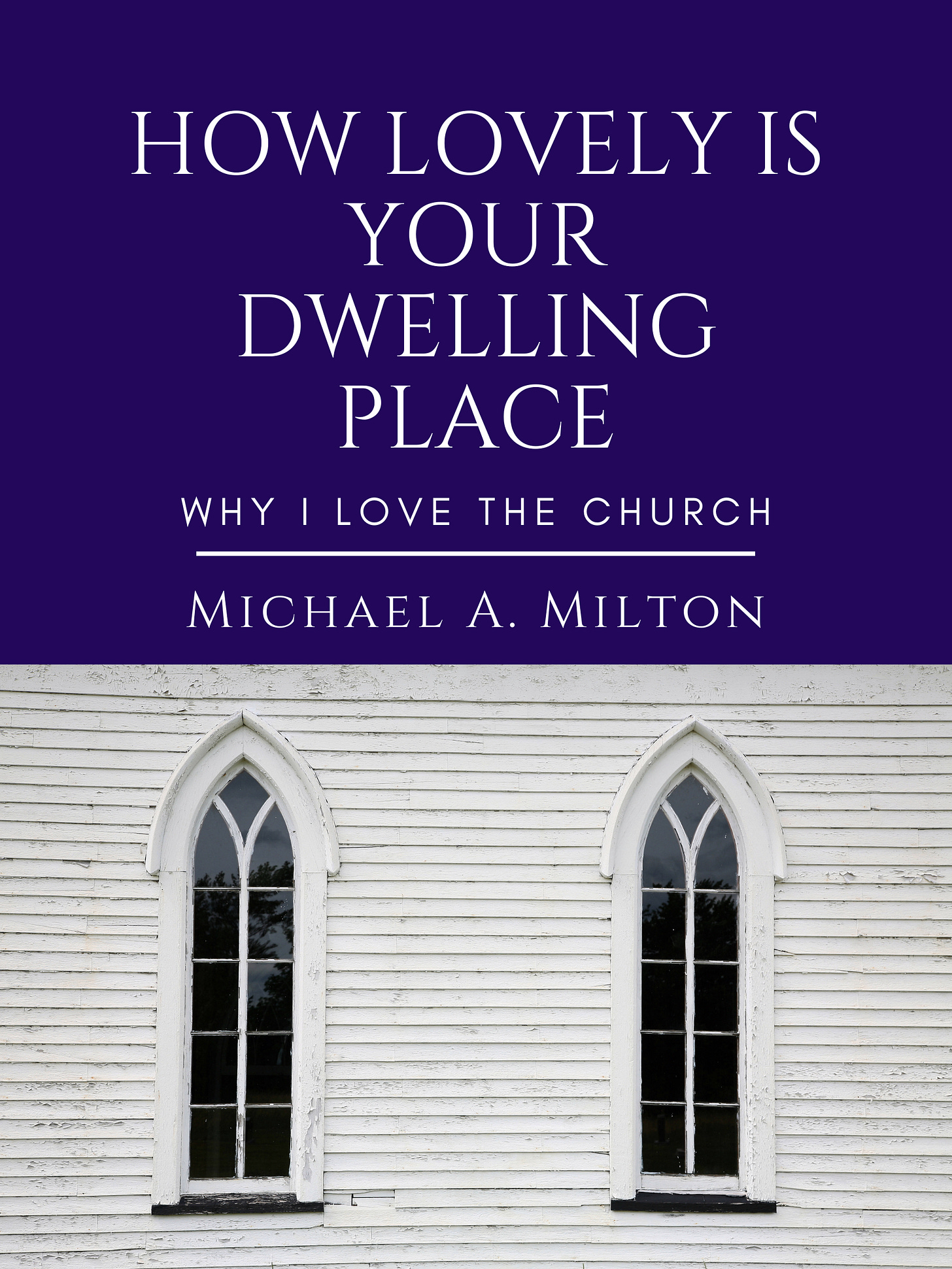Restless Beauty
The Church’s Unfinished Excellence: Chapter Two in How Lovely is Your Dwelling Place
This installment is intended to introduce Psalm 84 by reading. While we will consider its meaning and application in the questions for reflection and subsequent chapters, our goal in this installment is to “Read, mark, learn and inwardly digest” (As Archbishop Cranmer put it so memorably in the collect for the Second Sunday in Advent).1 As in any scenario where we seek to exposit universal truths from God’s Word, we must begin with a reading of the Sacred Text. Read it silently. Read it out loud. Note the distinct features as you read. Like a landscape by Turner or Constable, a portrait by Rembrandt or Sargent (art replicates God’s creative work), the Psalm will lead you from the foreground, through the middle, and to the deep, distant blue. Watch for clues. Be still, and the Holy Spirit who inspired the Psalm will reach across the millennia to bring His intent to you.
Of this text, two friends, who are fine commentators, wrote of Psalm 84:
There is a restlessness, a longing, in our hearts as human beings, a restlessness that can only be satisfied by the presence of God. Psalm 84 brings this longing to expression. Psalm 84 is a lovely psalm about the lovely dwelling place of God . . . But if the truth be known, the longing is for a presence more than a place. The place is longed for because of the presence that is there, the presence of God.
— Mark Futato and George Schwab, Cornerstone Bible Commentary 1
* * *
Now. We read the Psalm without further commentary. Read and pray through verses 1-2, 5-8, and 9-12. Only ask of the Lord,
“O God, by Your promises through Christ our King, make Your Word plain to me. And give me Your Holy Spirit to rightly read, understand, be transformed by, and obey the truths of Your Word. Through Christ our Lord. Amen.
As peer-reviewed research has demonstrated, reading the Psalms regularly provides an invaluable benefit to one’s spiritual and mental health. Thus, a summary from one such research paper I consulted:
“The symbolic language in Psalms can help express difficulties and emotions, identify with others in similar situations, and lead to a new way of living.”2
To read the Psalms is to begin a God-ordained therapy for soul repair, spiritual resiliency, and an awakening to the Christ of the Psalms.
Consider using the provided reflection questions that follow the Psalm. I added headings based on the three instances of “blessed,” which give the Psalm its Spirit-created, logical, sequential structure.2
* * *
Psalm 84
To the Chief Musician. On An Instrument of Gath. A Psalm of the Sons of Korah. 3
1 Blessed in Dwelling
1 How lovely is Your tabernacle, O Lord of hosts! 2 My soul longs, yes, even faints For the courts of the Lord; My heart and my flesh cry out for the living God. 3 Even the sparrow has found a home, And the swallow a nest for herself, Where she may lay her young— Even Your altars, O Lord of hosts, My King and my God. 4 Blessed are those who dwell in Your house; They will still be praising You. Selah
2 Blessed in Strength
5 Blessed is the man whose strength is in You, Whose heart is set on pilgrimage. 6 As they pass through the Valley of Baca, They make it a spring; The rain also covers it with pools. 7 They go from strength to strength; Each one appears before God in Zion. 8 O Lord God of hosts, hear my prayer; Give ear, O God of Jacob! Selah
3 Blessed in Faith
9 O God, behold our shield, And look upon the face of Your anointed. 10 For a day in Your courts is better than a thousand. I would rather be a doorkeeper in the house of my God Than dwell in the tents of wickedness. 11 For the Lord God is a sun and shield; The Lord will give grace and glory; No good thing will He withhold From those who walk uprightly. 12 O Lord of hosts, Blessed is the man who trusts in You!
* * *
1. Mark D. Futato and George Schwab in Cornerstone Biblical Commentary, Vol 7: The Book of Psalms, The Book of Proverbs (Carol Stream, IL: Tyndale House Publishers, 2009), 275.
2. “As-re: Happy, blessed is he, highly favored or fortunate; as by divine grace: Dt 33:29; Is 30:18; 32:20; 56:2; Ps 2:12; 32:2; 33:12; 34:9; 40:5; 41:2; 65:5; 84:5†“6, 13; 89:16; 94:12; 106:3; 112:1; 127:5†“128:2; 137:8†“9; 144:15; 146:5; Job 5:17; Pr 3:13; 8:32, 34; Da 12:12; 2 Ch 9:7 (33X). See The Lexham Analytical Lexicon of the Hebrew Bible (Bellingham, WA: Lexham Press, 2017).
3. The New King James Version (Nashville: Thomas Nelson, 1982), Ps 84:title–12.
Questions for Reflection
Our questions are designed to help the reader apply the concepts and lessons of the section. Think of these questions as “directional questions” that lead you on a path of conversation between your spirit and the Lord.
This reflection is based on Psalm 84. Consider its profound insights into longing for God’s presence, trust in His provision, and the beauty of dwelling in His house. Read. Be still and quieten your spirit before the Lord. Come into His presence with reverence and wonder. Pray that you may receive, obey, and be renewed.
* * *
1. Longing for the Presence of the Lord:
How does the Psalmist’s intense longing for the courts of the Lord and the beauty of His tabernacle inspire you to seek a deeper relationship with God? Reflect on moments when you have felt a similar yearning for the living God. How can this deep-seated desire influence your daily walk with Him, and in what practical ways can you cultivate a heart that continuously seeks His presence?
2. Journey Through the Valley of Baca (Weeping):
The psalmist talks about passing through the Valley of Baca and transforming it into a place of springs. This symbolizes the journey through trials with the strength found in God. Take a moment to reflect on a period in your life that felt like a Valley of Baca. How did you experience God’s strength during that time? Think about how these experiences have prepared you to appear before God in Zion. Also, consider how you can encourage others currently walking through their own valleys.
3. The Ultimate Reward of Trusting in the Lord:
The psalm concludes with the statement, “Blessed is the man who trusts in You,” emphasizing the blessings and protection bestowed upon those who put their faith in the Lord. Take some time to contemplate the importance of trusting in God during difficult times and despite the flaws of the Church. How do you demonstrate this trust in your life, particularly when faced with uncertainty or conflict within your faith community? What steps can you take to strengthen your trust in God’s promises, and in what ways can you serve as a witness to His faithfulness to those around you?
* * *
“Blessed Lord, who hast caused all holy Scriptures to be written for our learning; grant us that we may in such wise hear them, read, mark, learn, and inwardly digest them; that by patience and comfort of thy holy Word, we may embrace, and ever hold fast the blessed hope of everlasting life, which thou hast given us in our savior Jesus Christ” (Book of Common Prayer, 1662).
Reference
Michael A. Milton. How Lovely Is Your Dwelling Place: Why I Love the Church. Charlotte, NC: Bethesda Publishing Group, 2024. https://www.kobo.com/us/en/ebook/how-lovely-is-your-dwelling-place-why-i-love-the-church.
S. G. Meyer. “The Psalms and Personal Counseling.” Journal of Psychology and Theology, 2 (1974): 26 - 30. https://doi.org/10.1177/009164717400200104.









